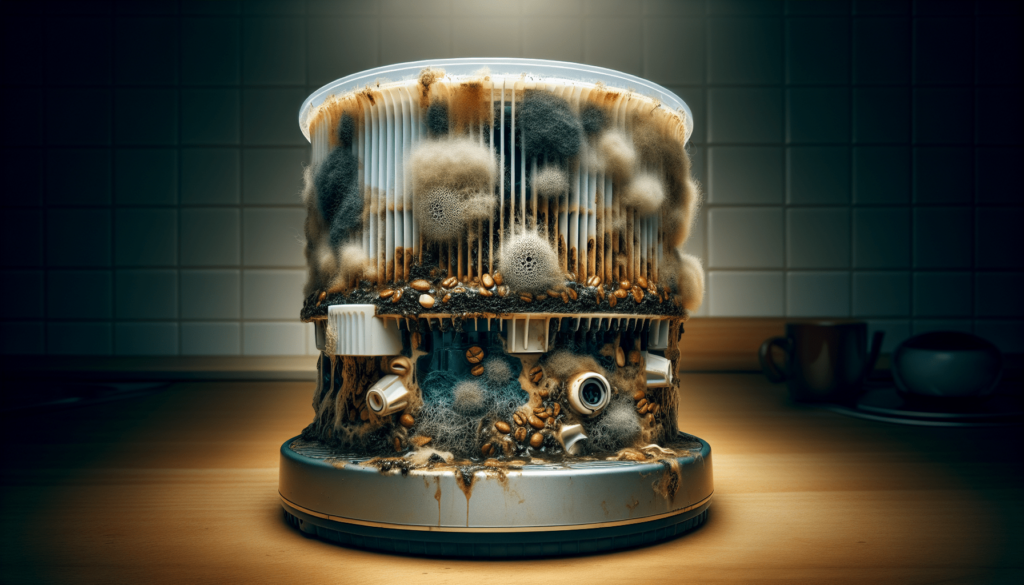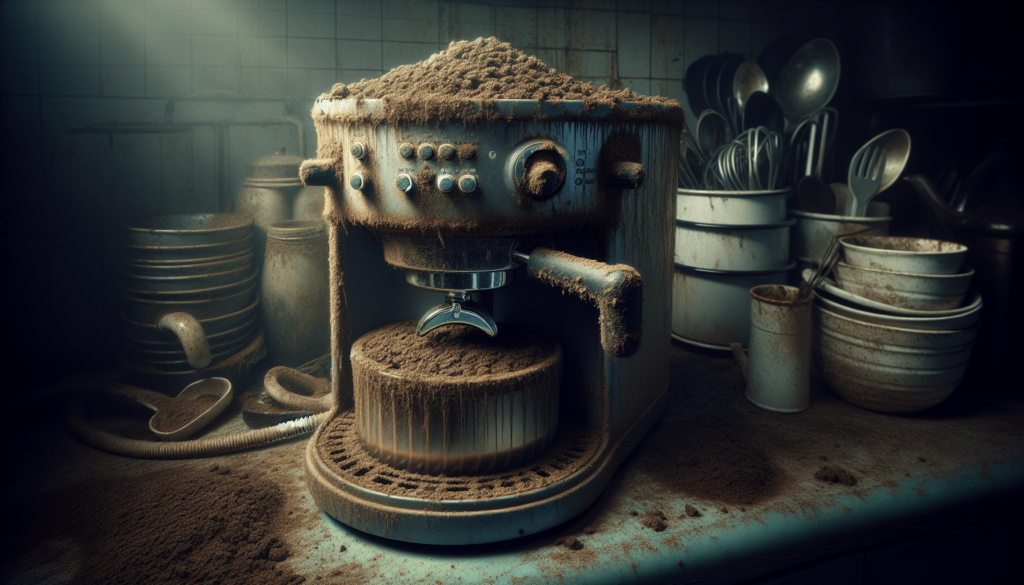Have you ever paused to consider what might be lurking in your coffee machine if you don’t clean it regularly? Many coffee lovers may not think cleaning their machine is particularly important, but the consequences of neglecting this task can be surprising and even alarming. This article delves into what can happen if you skip your coffee machine’s cleaning routine.

The Build-Up of Coffee Oils
When you make coffee, the oils from the coffee beans can accumulate inside your coffee machine over time. These oils can turn rancid, leading to a bitter taste in your coffee.
How Coffee Oils Accumulate
Coffee oils are released during the brewing process. With each cup, a small amount of leftover oil clings to the internal parts of your machine. These oils build up layer by layer, potentially affecting the flavor of future cups.
Impact on Taste
Bitterness in your coffee is often a direct result of these lingering oils. Coffee is meant to be a comforting, flavorful beverage, but dirty coffee machine parts can disrupt this experience. You may notice a sharp, unpleasant taste in what should be a smooth, rich coffee.
The Growth of Mold and Bacteria
One of the most significant concerns is the growth of mold and bacteria in an unclean coffee machine. Warm, damp environments are breeding grounds for these microorganisms.
Where Mold and Bacteria Thrive
Parts of your coffee machine, like the water reservoir and internal tubing, are highly susceptible to mold and bacteria. Over time, these parts can harbor colonies that pose health risks.
| Area of the Coffee Machine | Susceptibility to Mold and Bacteria |
|---|---|
| Water Reservoir | High |
| Internal Tubing | High |
| Coffee Pot | Medium |
| Coffee Filter Basket | Medium |
Health Risks
Consuming coffee made in a machine contaminated with mold and bacteria can cause a range of health issues. Common problems include gastrointestinal distress, allergic reactions, and respiratory issues. Keeping your machine clean helps you avoid these health risks, ensuring a safer, more enjoyable coffee experience.
Clogged and Malfunctioning Components
An unclean coffee machine can also suffer from internal clogs and component malfunctions. This is especially true for models with intricate parts and advanced technology.
How Clogs Develop
Coffee grounds, mineral deposits from the water, and residual coffee oils can combine to create stubborn clogs. These clogs obstruct the flow of water and steam within the machine, leading to poor performance.
Consequences for Your Coffee Machine
Repeated clogging and component wear can reduce the lifespan of your coffee machine. What might have been an efficient, reliable device can become a malfunctioning headache. Over time, the cost of repairs and potential replacements can add up.
Increased Energy Consumption
A neglected coffee machine often works harder than a clean one, leading to increased energy consumption. When the machine struggles to perform basic functions due to internal build-up and clogs, it requires more power.
Energy Impact
Using more energy not only costs more money but is also an inefficient use of resources. A clean machine runs more smoothly and efficiently, saving you on energy bills and helping you maintain an eco-friendly household.

Corrosion and Wear on Parts
Regular cleaning prevents the corrosion and wear of internal parts. Coffee machines, especially those made with metal components, are prone to corrosion if not adequately maintained.
Material Impact
Stainless steel parts are susceptible to corrosion over time, particularly when subjected to moisture and acid from coffee. Mineral deposits from hard water can also contribute to this issue.
Longevity of the Machine
Corrosion and wear substantially impact the longevity of your coffee machine. Proper cleaning routines can extend the life of your device, ensuring that your investment lasts as long as possible.
Water Quality Concerns
The water you use in your coffee machine can contribute to build-up if not addressed. Hard water, in particular, is laden with minerals that can scale up inside your machine.
Hard Water and Scaling
Hard water leaves behind calcium and magnesium deposits, which form scale. This build-up can affect your machine’s heating elements and water flow systems.
Effects on Flavor
Mineral build-up doesn’t just affect the machine’s operation; it can also affect the taste of your coffee. The scaling can give your coffee an off-taste, making what should be a delightful experience less enjoyable.
Ineffective Heating
Over time, scale and residue can affect your coffee machine’s heating elements, making them less effective. This can result in coffee that isn’t brewed at the optimal temperature.
Optimal Brewing Temperature
For the best-tasting coffee, the water temperature needs to be just right – generally between 195 to 205 degrees Fahrenheit. A dirty machine struggles to reach and maintain this temperature, resulting in weak, uninspired coffee.
Impact on Coffee Quality
Brewing at incorrect temperatures can also impact coffee extraction, leaving you with an underwhelming cup. Consistently cleaning your coffee machine ensures it brews at the optimal temperature every time.
Decreased Machine Performance
Overall machine performance suffers when you neglect cleaning. From brewing cycles to steam production, every function is compromised by residue build-up and clogs.
Performance Metrics
| Performance Metric | Impact of Not Cleaning |
|---|---|
| Brewing Cycle Time | Longer |
| Steam Production | Reduced |
| Coffee Strength and Flavor | Diminished |
| Machine Lifespan | Shortened |
A well-maintained coffee machine performs optimally, giving you great coffee every time. Ignoring cleaning requirements slows down these processes, diminishing your overall satisfaction.
Additional Cleaning Efforts Later
Procrastination often leads to more work down the road – a maxim that holds true for coffee machine maintenance as well.
Cumulative Build-Up
A minor amount of residue is much easier to clean than layers of built-up grime. The more you delay, the harder and more time-consuming the cleaning task becomes.
Necessary Cleaning Frequency
By sticking to a regular cleaning schedule, you reduce the amount of time and effort needed each time you clean. Simple, more frequent cleanings can prevent the need for deeper, more arduous maintenance in the future.
Tips for Regular Cleaning
Keeping your coffee machine in top condition doesn’t require extraordinary effort. Adopting a few simple habits can make a significant difference.
Daily Cleaning Routine
- Empty the Coffee Grounds: Dispose of used coffee grounds immediately after brewing.
- Rinse Components: Rinse the filter, pot, and other removable parts with warm water.
- Wipe Surfaces: Use a damp cloth to wipe down the machine’s exterior.
Weekly Cleaning Checklist
- Deep Clean the Pot and Filter Basket: Use mild dish soap and warm water.
- Check the Water Reservoir for Residue: Rinse thoroughly, possibly with a vinegar solution.
Monthly Maintenance
- Descale the Machine: Use a descaling solution or a mixture of vinegar and water to eliminate mineral build-up.
- Inspect for Wear and Tear: Look at the machine’s components for any signs of wear or corrosion.
Yearly Overhaul
- Professional Servicing: If possible, consider taking the machine to a professional for a deep clean and service.
- Replace Worn Parts: Change out any parts that show signs of wear, such as seals and gaskets.
Benefits of a Clean Coffee Machine
Cleaning your coffee machine regularly offers tangible benefits that enhance both your coffee experience and the machine’s lifespan.
Enhanced Coffee Taste
A clean machine ensures that the flavor of your coffee is not compromised by lingering oils or old coffee residues. Every cup tastes as fresh as the first.
Extended Machine Lifespan
Regular maintenance can dramatically extend the life of your coffee machine. This investment of time saves you money in the long run by reducing the need for repairs or replacements.
Reduced Health Risks
By keeping mold and bacteria at bay, you protect yourself and your loved ones from potential health risks. This small act of hygiene can make a big difference.
Improved Efficiency
Your machine operates more efficiently when clean, using less energy and producing better coffee in less time. This not only saves you money but also provides a more enjoyable coffee-making experience.
Conclusion
The consequences of not cleaning your coffee machine range from diminished taste and machine performance to serious health risks. Regular maintenance extends your machine’s lifespan, ensures optimal performance, and provides the best possible coffee experience. Taking a few minutes to clean your machine can lead to countless benefits, making it a habit worth adopting. Next time you brew a cup, think about what’s happening inside your coffee machine, and remember that a little effort goes a long way.
